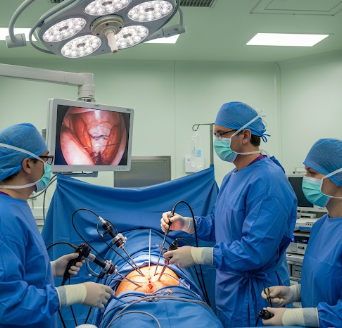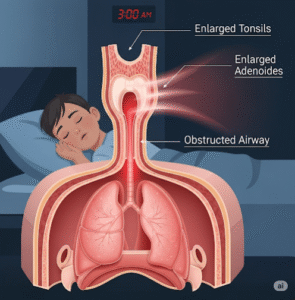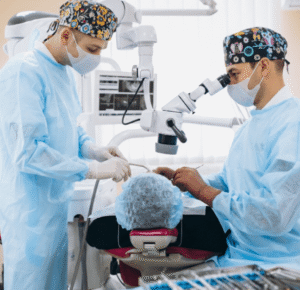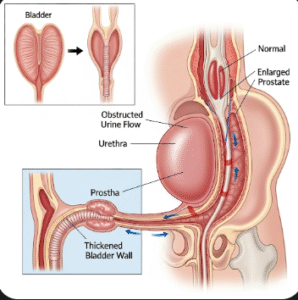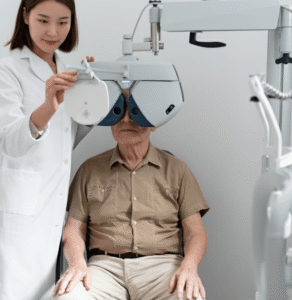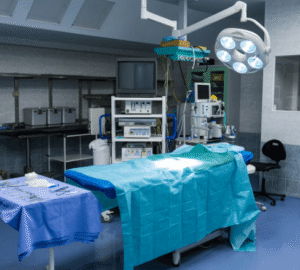Overview
Surgery for rectal cancer is a definitive medical procedure aimed at removing cancerous tumors from the rectum, the last part of the large intestine. Rectal cancer can cause bleeding, bowel habit changes, pain, and obstruction. Surgical intervention is often the primary treatment and is sometimes combined with chemotherapy or radiotherapy depending on the tumor stage.
In Korea, rectal cancer surgery is performed in world-class colorectal centers using advanced minimally invasive, laparoscopic, robotic, or open techniques, ensuring high success rates, minimal complications, and improved postoperative outcomes.
What is Surgery for Rectal Cancer?
This surgery involves removing the tumor along with surrounding healthy tissue and lymph nodes to prevent cancer spread.
Common surgical approaches include:
- ✦ Low anterior resection (LAR): removal of the rectum while preserving the anal sphincter for normal bowel function.
- ➤ Abdominoperineal resection (APR): removal of the rectum and anus with permanent colostomy, usually for tumors near the anus.
- ✦ Transanal excision: minimally invasive removal of early-stage tumors through the anal canal.
- ➤ Robotic-assisted rectal surgery: enhances precision, reduces blood loss, and improves recovery.
The main goal is to completely remove the cancer, preserve bowel function when possible, and prevent recurrence.
What are the Benefits?
Surgery for rectal cancer provides several advantages:
✅ Removes cancerous tissue completely, reducing recurrence risk.
➤ Preserves bowel and anal function in sphincter-sparing procedures.
✦ Minimally invasive and robotic techniques reduce hospital stay and postoperative pain.
➤ Improves long-term survival when combined with appropriate oncologic therapy.
✅ Reduces complications such as obstruction, bleeding, or perforation.
✦ Enhanced recovery programs in Korea optimize healing and overall outcomes.
Procedure Details
1) How should I prepare for Surgery for Rectal Cancer?
Preparation steps include:
- ✦ Comprehensive evaluation: medical history, medications, allergies, prior abdominal surgeries.
- ➤ Diagnostic tests: colonoscopy, CT scan, MRI pelvis, endorectal ultrasound to assess tumor size and lymph nodes.
- ✦ Laboratory tests: blood count, kidney and liver function, coagulation profile.
- ➤ Preoperative bowel preparation: cleansing regimen to empty the bowel.
- ✦ Medication adjustments: anticoagulants or other medications may need temporary cessation.
- ➤ Consent and counseling: discuss procedure type, potential colostomy, risks, benefits, and recovery expectations.
2) What happens during the procedure Surgery for Rectal Cancer?
The procedure is performed under general anesthesia:
➤ Step 1: Patient is positioned supine or lithotomy, and the abdomen sterilized.
✦ Step 2: Laparoscopic, robotic, or open incisions are made for access.
➤ Step 3: The rectum containing the tumor is carefully mobilized, with surrounding lymph nodes dissected.
✦ Step 4: Tumor and affected tissue are removed.
➤ Step 5: Depending on procedure, bowel continuity is restored (anastomosis) or colostomy is created.
✦ Step 6: Hemostasis is ensured, incisions are closed, and sterile dressing applied.
Korean centers prioritize minimally invasive approaches to reduce trauma, blood loss, and recovery time.
3) What happens after Surgery for Rectal Cancer?
Postoperative care includes:
- ✦ Monitoring: vital signs, wound, and bowel function.
- ➤ Pain management: IV or oral analgesics as needed.
- ✦ Diet progression: liquids initially, advancing to soft foods and regular diet as tolerated.
- ➤ Wound care: clean and dry incision sites; monitor for infection.
- ✦ Activity guidance: early mobilization encouraged to reduce clot risk and improve recovery.
- ➤ Follow-up: assessment of healing, bowel function, and planning of adjuvant therapy if required.
Recovery time varies: 2–6 weeks for minimally invasive surgery, longer for open surgery or colostomy procedures.
Risks / Benefits
Potential Risks:
- ✦ Infection or abscess formation at the surgical site.
- ➤ Bleeding or hematoma.
- ✦ Anastomotic leak if bowel reconnection fails.
- ➤ Bowel obstruction or adhesions post-surgery.
- ✦ Rare injury to surrounding organs (bladder, ureter, nerves).
Benefits:
- ✅ Complete removal of cancerous tissue.
- ✅ Reduces recurrence risk and improves long-term survival.
- ✅ Preserves bowel function in sphincter-sparing surgeries.
- ✅ Minimally invasive techniques shorten hospital stay and reduce pain.
- ✅ Multidisciplinary Korean centers provide optimized recovery and oncologic outcomes.
Recovery and Outlook
Recovery after rectal cancer surgery generally includes:
- ➤ Hospital stay: 5–10 days depending on procedure type and patient condition.
- ✦ Pain management: controlled with prescribed analgesics.
- ➤ Diet progression: liquids first, advancing gradually.
- ✦ Activity: light walking immediately; avoid heavy lifting for 4–6 weeks.
- ➤ Long-term outcome: most patients achieve good bowel function, symptom relief, and enhanced survival when combined with chemotherapy or radiotherapy as needed.
When To Call the Doctor
Contact your healthcare provider if you notice:
⚠ Severe abdominal or pelvic pain.
⚠ Fever, chills, or wound infection signs.
⚠ Persistent vomiting, diarrhea, or constipation.
⚠ Bleeding from the rectum or stoma site.
⚠ Difficulty passing urine or severe bowel dysfunction.
Best Korea Option / Process
Korea provides world-class surgery for rectal cancer with:
- ✦ Expert colorectal surgeons skilled in laparoscopic, robotic, and open procedures.
- ➤ Advanced imaging and preoperative planning for precise tumor removal.
- ✦ Minimally invasive and robotic-assisted techniques for faster recovery and lower complications.
- ➤ Comprehensive pre- and post-operative care, including oncology support, nutrition, and rehabilitation.
- ✦ Safe and effective treatment for both international and domestic patients.
- ➤ Multidisciplinary care for optimal oncologic outcomes and quality of life.
Korea ensures patients receive safe, precise, and effective treatment for rectal cancer with minimal complications and excellent long-term outcomes.
Highlights of Surgery for Rectal Cancer in Korea
- ✅ Minimally invasive laparoscopic and robotic-assisted options.
- ➤ Complete tumor removal with reduced recurrence risk.
- ✦ Sphincter-sparing techniques preserve bowel function when possible.
- ➤ Optimized recovery programs with multidisciplinary support.
- ✅ Comprehensive pre- and post-operative care for enhanced long-term outcomes.

